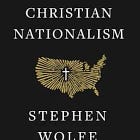The Case for Christian Nationalism
10. The Foundation of American Freedom | II. Puritan New England and Free Expression (Part 1)
Previously:
In every famous incident in which New England authorities “persecuted” dissenters - Roger Williams, Antinomians, Quakers, and Baptists - the authorities claimed to have good civil grounds to suppress the expression of dissenting religious belief… In their accounts of these events, New England authorities denied that they conducted persecution; rather, they suppressed those who (in their minds) disturbed the peace of the church and the state.1
“In their minds” is the operative phrase in this statement, for it was varying, subjective interpretations of Protestant Christian doctrine that led to events that were either justified suppression or unwarranted persecution. Should a Presbyterian state-church be instated today, would the vocal protestations of Baptists be considered disturbing the peace? Wolfe references minister and theologian John Cotton’s account of how “some” Antinomians and Baptists were allowed to attend state Congregationalist churches (while omitting what the conditions of this arrangement were), and how Presbyterians were allowed to have their own congregations. But Cotton’s writings were in defense of the Massachusetts colony’s expulsion of Roger Williams and other dissenters; he is far from an objective observer of the matter.
What Wolfe completely ignores in this section is how Catholics were treated in colonial America. Here are some notable events:
A law banning Jesuits entry into Massachusetts was passed in 1647, and the 1691 colonial charter of New England stated that “no Jesuit or spiritual or ecclesiastical person ordained by the authority of the Pope or See of Rome was allowed within the colony”.2
In both England and colonial America, those denounced as Catholics could have their property and entire estates confiscated.3
In 1649, Maryland passed the Toleration Act, designed to protect the Catholics in the colony, which was specifically chartered under the Catholic Lord Baltimore, from the majority of Protestant settlers. The Protestants ultimately gained control of the legislature in 1654, banned Baltimore from the colony, banned the mass, and passed a new act, which stated “none who profess to exercise the Popish religion, commonly known by the name of Roman Catholic religion, can be protected in this province.” By the 1740s, Maryland law held that priests who evangelized were to be declared guilty of treason and made subject to the common penalties for that offense.4
In 1696 the New Hampshire legislature passed an order requiring all inhabitants to take an oath against the Pope and the doctrines of the Catholic religion.5
When Georgia was first chartered, an inspector was appointed to make sure that no Catholics immigrated.6
In the colonies, Guy Fawkes day was made Pope Day and an effigy of the Pope was commonly burned. This tradition lasted through the revolutionary era, and was publicly denounced by George Washington.7
In Virginia, where the official church was Anglican, rumors that Catholics were allying themselves with natives “to cut the throats of the Protestants” resulted in the legislature passing a law preventing Catholics from settling in large groups. A law passed in 1641 required all priests to leave Virginia’s borders on being warned by the governor.8
In New York, Catholic Thomas Dongan was appointed governor by James II. His policy of toleration attracted many Catholics seeking to escape persecution elsewhere, but caused resentment and alarm among Protestant settlers. When the king was deposed in the Glorious Revolution of 1688, New Yorkers seized the opportunity, removed Dongan, and replaced him with Jacob Leisler, who quickly outlawed Catholics from “places of trust” and ordered the arrest of “refuted Papists”. A decade later, the colony required that all Catholics be disarmed, under threat of imprisonment. In 1741, when a fort and several houses were burned down, a man suspected of being a priest was lynched.9
Next:
Stephen Wolfe, The Case for Christian Nationalism (Moscow, Idaho: Canon Press, 2022), 402-403.
Michael Williams, Shadow of the Pope (New York: Whittlesey House, McGraw-Hill Book Company, 1932), 24, 26.
Ibid., 14.
Ray Allen Billington, The Protestant Crusade,1800-1860, First Paperback (Chicago, Illinois: Quadrangle Books, 1964), 6, 11; Michael Williams, 26.
Ray Allen Billington, 9.
Ibid., 10.
Michael Williams, 36.
Ray Allen Billington, 7, 10.
Ibid., 8, 14.



